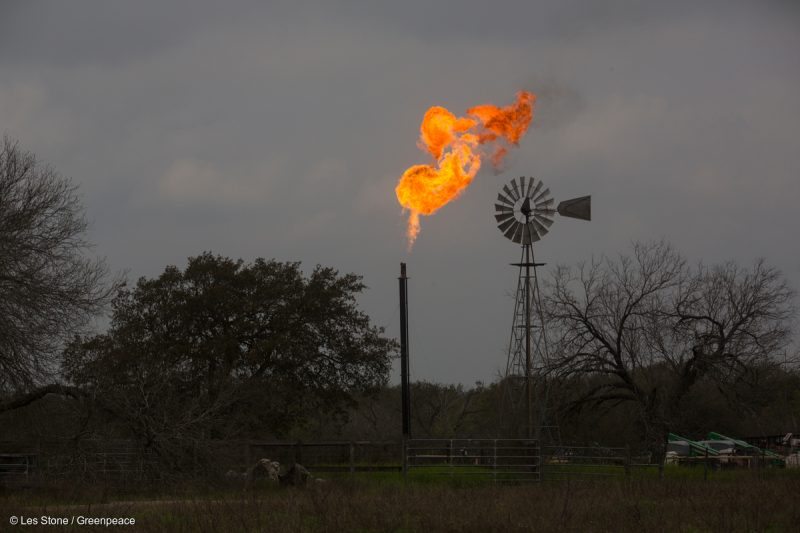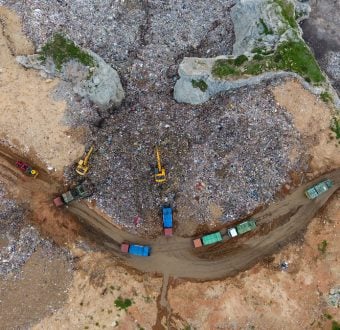This week we got to watch billionaires at work. With the COVID-19 pandemic reducing global demand for oil and the Russia-OPEC spat boosting oil supply, the price of oil crashed dramatically to below $35 per barrel. If prices stay at this level for a prolonged period, it’s likely that a lot of US oil and gas operators will be driven out of business, potentially putting a lot of people out of work.
If oil prices stay as low as they are right now (~$30/barrel) for several months, the oil industry in the US, Canada, and UK will be severely crippled.
Fracking, tar sands, North Sea, and Arctic drilling is not profitable at $30 oil and will be shut down.https://t.co/kfSxkzQ6r0
— Eric Holthaus (@EricHolthaus) March 8, 2020
Trump’s first concern is always for himself. But his second thought was to shovel bailout money at oil and gas companies directly, including some of his biggest donors.
We’re in a global health and economic crisis and Trump wants to bail out, you guessed it, the oil industry 😤 https://t.co/BNhGTPY2vX
RT if you think taxpayers’ money should go to workers and communities, not the billionaires who created the climate crisis!
— Greenpeace USA (@greenpeaceusa) March 10, 2020
As usual, Trump is proposing the exact worst response you could think of. Meanwhile, the oil and gas industry is charging ahead with a reckless business model that puts the climate in peril, and has done a disastrous job preparing workers and communities for its inevitable decline. In order to prevent workers from being hung out to dry, we need a plan to gradually phase out fossil fuel companies, not bail out the wealthy CEOs and investors.
And, just as urgently, we need a concrete plan to ensure that every worker and impacted community will be better off as we gradually transition off fossil fuels and ramp up investment in clean energy jobs.
No Workers Left Behind
There is no way to avoid the worst impacts of climate change without shrinking the fossil fuel industry and growing clean energy solutions. Transition is inevitable. Whether it will be just, equitable, and well-organized or unfair, greedy, and chaotic, is the challenge in front of us.
With thoughtful planning, smart policies, and leadership from communities, we can ensure that the fossil fuel workforce is able to seamlessly transition to good, family-sustaining union jobs in an economy based on clean energy and climate protection. But so far, concrete policies are too few and far between. The time has come to put these plans into motion, before these current crises tip us into a recession with major oil and gas job losses.
Democrats already have a plan for the next recession. It's called the Green New Deal. @MarkVinPaul and I wrote about how to think about stimulus, deficits and climate for the @DataProgress blog:https://t.co/r724dDLJ9z
— Julian Brave NoiseCat (@jnoisecat) March 9, 2020
How to support workers through a managed decline of the fossil fuel sector
Fossil fuel companies must be held accountable to keep their promises to workers, and, if not, the government should act as a backstop to ensure that all retirement and pension benefits are guaranteed. In a managed decline of the fossil fuel sector, disruption to workers and families can be minimized by taking advantage of the natural rate of retirements, but only if workers can trust that promises will be kept.
For any workers who lose their job in the market turmoil, the government must ensure five years of full wage support, as well as extensive job training and relocation support if necessary. Healthcare is a human right, and the government should not only ensure health benefits for these workers, but universal health care for the entire country.
The right to organize and collectively bargain must be defended and strengthened so that new green jobs will pay as well or better than the jobs being phased out. The federal government can lead the way by requiring Community Benefits Agreements, Project Labor Agreements, and strong Prevailing Wage laws in all of its projects. A just transition plan from Gov. Jay Inslee has aimed for “federal clean energy wage that averages $25/hour for skilled workers for clean energy jobs created and supported with federal funds.”
In many places, from Alaska to New Mexico, oil and gas revenues are hugely important in funding crucial government services, such as education. The federal government can set up financing options to help these state and local governments can maintain services through the transition. The government should set up a Just Transition Office to coordinate the different policies and moving parts that will be needed for success.
We know what an unjust transition looks like
Workers know what an unjust and unmanaged transition looks like.
We need only look to the coal industry — where bankrupt companies dole out million-dollar bonuses to CEOs while slashing their workers’ pensions and health benefits — to see that fossil fuel executives do not have workers’ interests at heart. As one example, when coal company Blackjewel went bankrupt, workers were forced to blockade coal train shipments for two months in order to win the backpay that was owed to them.
Black Jewel miners are used to hard work & ask only for the pay they earned. Witnessing their peaceful protest on the train tracks tonight & the love shown from our community made me swell with pride for my mountain home and some of the best people in the world. #NoPayWeStay pic.twitter.com/z3irOlLubz
— Angie Hatton (@AngieHatton16) August 1, 2019
When a catastrophic fire closed a major refining complex in Philadelphia, the company filed for bankruptcy and laid off hundreds of union workers with very little support. The fallout from that decision has shown once again why real transition policies with sufficient funding need to be in place now.
The fight over the bankrupt Philly refinery turned into an ugly fight between workers and climate activists. “They say they support us, but there’s no plan for us,” one laid-off worker told me. Here’s how things have played out differently across the US https://t.co/GwF0lmVu1M
— Juliana Feliciano Reyes (@juliana_f_reyes) March 6, 2020
Unfortunately, too much of the conversation in Washington, DC around the coronavirus has focused on using taxpayer dollars to prop up wealthy CEOs and shareholders instead of working families. That dynamic will only change if politicians understand we will vote out anyone who listens to billionaire donors before their own constituents.
TRANSITION IS INEVITABLE, JUSTICE IS NOT: A CRITICAL FRAMEWORK FOR JUST RECOVERY
Guided by the leadership of… https://t.co/1sKK068LuA
— Movement Generation (@MoveGen) December 20, 2017
Trump keeps bailing out this dying industry instead of investing in a Green New Deal that truly protects workers from economic uncertainty, ensures long-term prosperity for communities, and protects the climate. It’s time for him to face a reckoning.
Message your member of Congress now to stop Trump’s fossil fuel bailout.



